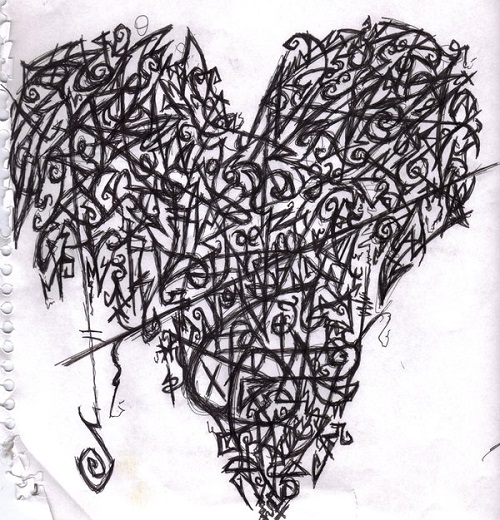FWP:
SETS == WORDPLAY
MADNESS: {14,3}
Here's a beautifully piquant example of the double sense of the possessive in Urdu. While usually in English 'the longing for you' is in my heart, and 'your longing' is in your heart, in Urdu terī tamannā would be perceived first as 'the longing for you' (located in my heart), with 'your longing' (that is, the longing that's in your heart) as a secondary possibility. (For further discussion and illustration of this point, see {41,6}.) Here, Ghalib plays on that doubleness: the beloved should look at the trouble the poor 'longing' is in, enmeshed in the convoluted pech-o-tāb of the lover's mad heart! She should have mercy on it, because it's 'her own longing' [apnī tamanna].
What?! we say-- why has she sent 'her longing' into such a dangerous and uncharacteristic situation?! Of course, because it's really a 'longing for her' that's found in the lover's disturbed heart. Ghalib requires us to take in the whole situation at a glance, deduce whose 'longing' it really is, and realize with no further prompting how the lover is seeking to induce the beloved-- and us-- to shift the interpretation, knowingly or naively, from the normal first sense to the less common second one, as a trick to elicit her sympathy. Is this wordplay, or grammar-play, or meaning-play, or idiom-play? All of the above, of course. Isn't it a kind of compliment that the poet has such confidence in the our interpretive powers?
Nazm and Bekhud Dihlavi also point out the invocation of the (unstated) idea that a longing when it is fulfilled can be said to 'emerge' [nikalnā]; so that by depicting the pathetic longing as ensnared in the terrible writhing tangle of pech-o-tāb , and by urging the beloved to consider it her own, the lover is really begging her to 'cause it to emerge' [nikālnā]-- that is, to fulfill it. For the classic example of this use of nikalnā , see {219,1}.
The concept of an 'enchantment' [t̤ilism] comes from the realm of the
dastan world, which is dominated by the story of Hamzah.
Such enchantments are often created by evil magicians, and once one has entered
them one is unable to escape without special, often divine, help. Thus it's very appropriate to ask the beloved for a 'divine intervention'
on behalf of the poor struggling 'longing'.

Nazm:
That is, my heart is full of pech-o-tāb . The longing for you [terī tamannā] has come into it, and become ensnared. Have mercy on it, and release it from that difficulty. The result is-- make my desire and longing 'emerge' [nikālnā]. (169)
== Nazm page 169